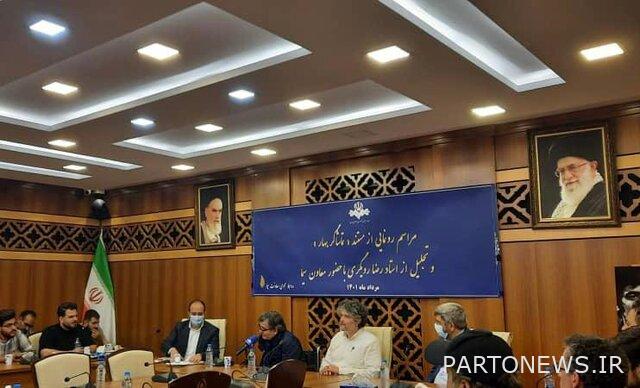I am waiting for Dawood Mirbagheri to call me

At the unveiling ceremony of the documentary portrait of Reza Ruigiri, the actor announced his role in the religious historical series “Salman Farsi” directed by Dawood Mirbagheri. Roygari played the role of “Kisan Abu Omreh”, the commander of the Iranian army, in the series “Mokhtarnameh” by this director, and 19 years ago, he appeared in the role of “Saadoun” in the series “Innocence Lost”.
Charso Press: The unveiling ceremony of the Reza Ruigiri portrait documentary was held at the Sedosaima conference hall on Wednesday, the 5th of August, at the same time as the dedication ceremony of this veteran cinema and television artist.
In this ceremony, Reza Ruigiri, Mohsen Barmahani, Vice President of Sima, Mohsen Yazdi, Director of Documentary Network, Hamid Khajenejad, Director of Public Relations, Vice President of Sima, producers of the documentary, a group of Reza Ruigiri’s close friends and media associates are present.
This documentary was directed by Abulfazl Tawakli and produced by Abulfazl Mohammad Baqer on the Sima Documentary Network.
Actor Reza Ruigiri said at the unveiling ceremony of his portrait documentary: Once in Kahrizak, they took me to the doctor, the doctor said that you are healthier than all of us. But I was taken to a place where there was a wall between me and Behesht Zahra (PBUH) and I saw hallucinations at night.
Rugari about whether he is still interested in playing a role or not? He said: Yes, I am still interested in playing. It is what I chose. I love it. I have the energy to work and I hope to be able to serve people soon. I am waiting for Mr. Dawood Mirbagheri to call me so that if it is part of it, I will go and play in “Salman Farsi” series.
This actor said: Many of my works were not seen, I acted in many theaters and movies.
In the continuation of this ceremony, Tavakoli, the documentarian of the portrait of Reza Ruigiri, said: I am grateful that Mr. Ruigiri trusted our group. Other groups also wanted to make a documentary about his life, but he was kind to us. Mr. Roygari had a very good memory in this work.
This director also took advantage of the opportunity of SIMA’s deputy to attend the ceremony and said: “It is very difficult to film inside the Sedavasima organization. I hope that Mr. Barmahani (SIMA’s deputy) will make arrangements to solve this problem for the documentary makers.”
Referring to the problems of the documentary field in terms of budget, the producer Mohammad Baqer noted: the director of the documentary network left every stone to honor the veterans of art. The documentary of Mr. Ruigiri was chosen because his character had three aspects; Both music, painting and acting. I request Mr. Burmahani to increase the budget of the documentary network a little.
Burmahani, the vice president of Sima, who was not ready to talk to the journalists who were present at the ceremony, said at the unveiling ceremony of the Reza Ruigari documentary: I imagine that this work was produced so that we would not forget where we were and what path we took until Art arrived here.
Addressing this actor, he said: If you are neglected and if something unpleasant happens to you, it should be a source of shame for those in charge. I sincerely and sincerely wanted to reach your home and remind myself that we are still students of honorable people like you and appreciate the great steps you took for the culture and art of this country. We love to see you always so cheerful. God willing, Iranian television and cinema will continue to use your presence.
According to this ISNA report, in the documentary Portrait of Reza Ruigiri, the artist’s childhood memories are told in his own language, his friends and neighbors, and songs with his own voice are played in between the conversations.
In this documentary, Ruigiri emphasizes that he was born in a religious family that had nothing to do with cinema and acting. Ruigiri explains that he started his career with theater and sang along with acting in plays. He recounts his memories of singing the revolutionary anthem “Iran Iran” and singing for the movie “Hamon” by Dariush Mehrjooi.
In another part of his recordings in this documentary, this actor talks about the difficulty of dubbing and says that when he started working in cinema, the dubbers spoke instead of the actors, and he dubbed only one of his films called “The Man in the Mirror” by himself. He understood that dubbing is a difficult task.
Abolfazl Alaei and Mohammad Varzendeh are the videographers, Mehrdad Moghdisi and Vahid Nowrozi are the sound operators, Mohammad Akhwan is in charge of editing, and Jaber Majdi is the production manager of the “Behar Spectator” documentary.

